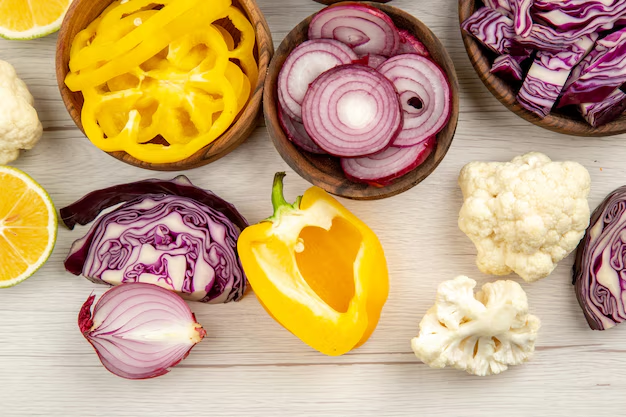The Onion Quandary: Should You Refrigerate Your Onions?
It’s a question as old as the crisper drawer itself: Should onions be kept in the refrigerator? Despite their everyday presence in kitchens around the world, onions remain enigmatic in terms of appropriate storage practices. To slip them into the fridge or to leave them in the pantry? That is the question. Let’s delve into the depths of onion storage, uncovering truths and myths to ensure your dishes are both aromatic and safe.
🧅 Revisiting Onion Storage Habits
The Case Against Refrigerating Onions
Onions have been a staple in human diets for centuries, contributing flavor, nutrition, and a fragrant base to countless dishes. However, when it comes to storage, should these pungent bulbs make their home in your pantry or your refrigerator?
1. Moisture and Mold:
Refrigeration increases moisture, which onions are particularly sensitive to. This environment can lead to mold growth and spoilage faster than the dry conditions of a pantry shelf.
2. Texture Transformation:
Cold temperatures can change the texture of onions, making them soft and mushy upon retrieval. The crisp bite needed in many recipes may be jeopardized by refrigeration.
The Case for Refrigerating Onions
While there are adverse effects to consider, there are situations where refrigerating onions could be advantageous.
1. Cut or Sliced Onions:
Once an onion has been cut, the refrigerator becomes its new best friend. Refrigeration helps to preserve freshness and slows down microbial growth on the exposed part.
2. Soft or Perishable Varieties:
Certain varieties, like sweet onions, don't last as long as their robust relatives. These may benefit from refrigeration to extend their freshness due to their higher water content and lower sulfur levels.
🏠 Ideal Onion Storage Attributes
So, if the refrigerator isn't typically the ideal venue for whole onions, what is? Let's explore the optimal storage conditions for these culinary wonders:
Dry and Cool Areas
Whole onions thrive in a cool, dry environment where air can circulate freely around them. A temperature between 45°F to 55°F is typically recommended.
Ventilation
Using perforated bags or mesh storage bins allows air to circulate, reducing the risk of spoilage. Proper ventilation prevents the accumulation of moisture and the growth of mold.
Dark Spaces
Light can induce sprouting, which affects the flavor and texture. Ensuring onions are kept in a dark place can help maintain their integrity and taste longer.
Separation from Certain Vegetables
Be cautious about storing onions next to certain vegetables, particularly potatoes. The ethylene gas released by onions can cause potatoes to sprout and spoil more quickly.
🍽️ Practical Storage Tips and Tricks
Storing Whole Onions
- Mesh Bags: Use breathable mesh bags to promote air circulation.
- Pantry Position: Keep onions in a designated area in your pantry or cellar to ensure the environment is not overly humid.
- Away from Potatoes: Store onions away from potatoes to prevent premature spoilage and sprouting.
Storing Cut or Sliced Onions
- Sealable Containers: Place cut onions in airtight containers before refrigeration.
- Use Quickly: Consume refrigerated cut onions within a week to ensure food safety and flavor retention.
- Covered and Protected: Use plastic wrap to cover exposed onion parts before storing, decreasing moisture exposure.
Related Refrigerator Topics: Understanding Food Storage
Why Some Foods Shouldn't Be Refrigerated
It’s not just onions that might suffer from unnecessary refrigeration. Here are a few other foods that find their zen in the pantry:
- Tomatoes: Cool temperatures can make them lose flavor and develop a mealy texture.
- Bread: Refrigeration can cause bread to become stale faster than storage at room temperature.
- Garlic: Like onions, whole garlic bulbs last longer in dry, dark conditions.
Yet, Some Items Love the Cold
On the flip side, some foods retain their quality much longer when stored in the refrigerator:
- Berries and Grapes: These fruits stay fresher and remain plump when chilled.
- Leafy Greens: The refrigerator keeps them crisp and slows wilting.
- Dairy Products: Necessary for food safety, keeping items like milk and cheese refrigerated is non-negotiable.
📌 Summary: Onion Storage Made Simple
To wrap things up, here’s a quick guide to mastering onion storage:
- Whole Onions: Store in a cool, dry, ventilated, and dark place away from other ethylene-sensitive produce like potatoes.
- Cut or Sliced Onions: Keep refrigerated in airtight containers to maintain freshness and quality.
- Avoid Refrigeration for whole onions to prevent moisture-related spoilage and texture changes.
🍳 Final Insights
Understanding the intricacies of onion storage can elevate your culinary creations while minimizing waste. Whether reveling in the pungent aroma sautéing in a pan or enjoying the fresh crunch in a salad, properly stored onions ensure that your dishes are pantry potent and fridge fresh. Embrace the wisdom of storage do’s and don’ts, and your onions will repay you with their best performance, plate after plate.

